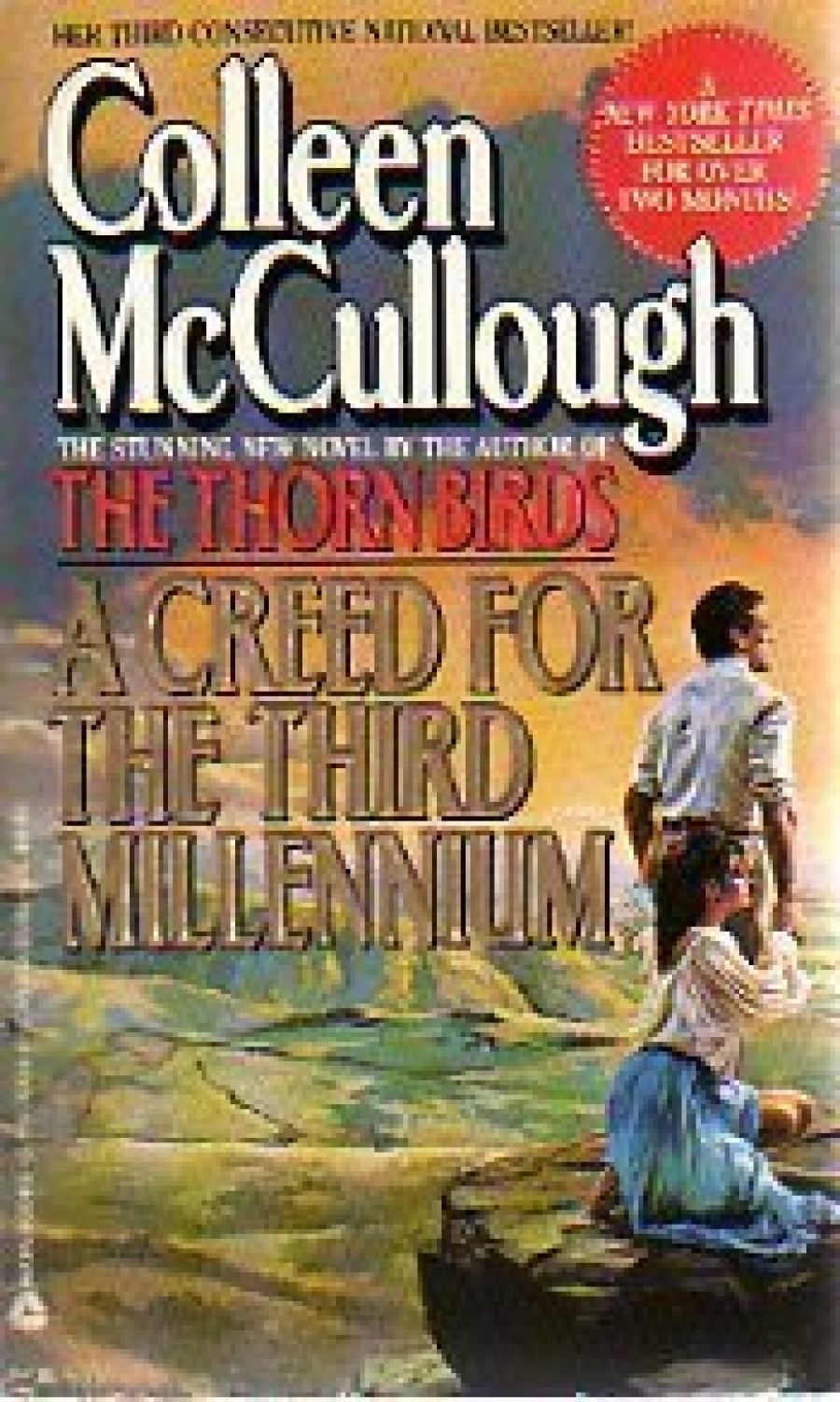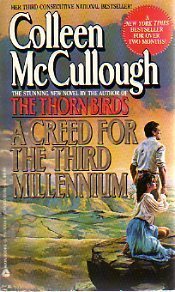
- Free Article: No
- Contents Category: Fiction
- Review Article: Yes
- Article Title: A Corny Creed
- Article Subtitle: Colleen as Messiah
- Online Only: No
- Custom Highlight Text:
The apocalypse might have seemed like pretty stimulating stuff when St John was writing about it, but these days. the post-Apocalyptic landscape is a well-trodden literary territory. This fact notwithstanding, Colleen McCullough’s latest screen-fodder epic, A Creed for the Third Millennium, goes back to the future one more time, to the year 2032, when mankind is under threat, not from nuclear war but from an incipient ice age. This is because the world’s glaciers have put on an uncharacteristic turn of speed, but curiously, this improbable and unexplained phenomenon is one of the few indications that the setting is the future – otherwise the impression one gains is that technology has stood still for fifty years. As is so often the case it is the Department of Environment, which is fostering a secret plan to find a man of charisma and use him as a messiah to bolster the flagging morale of the people of America. The person in charge of this program is Dr Judith Carriol, and the man eventually chosen for the job of messiah is Dr Joshua Christian. If the significance of those names goes unnoticed, it should be remarked that Dr Christian lives with, among others, his brothers, James and Andrew, and his sister Mary. McCullough is very much a proponent of the bludgeon approach to symbolism, as if the difficulties inherent in successfully rewriting the story of Christ’s preaching years weren’t great enough without this fatal tendency to make every allusion so painfully clear, and to drag the plot out in a similarly unsubtle fashion.
- Book 1 Title: A Creed for the Third Millennium
- Book 1 Biblio: Harper & Row, $19.95, 346 pp
- Book 1 Cover Small (400 x 600):

- Book 1 Cover (800 x 1200):

The first part of the book, detailing the search for the possible messiah, is an eminent example of this weakness. While pages and pages pass without much happening, without any psychological or dramatic tension, and consequently without sustaining interest, the general dullness is only occasionally relieved by morbid fascination provoked by the murder of the English language. The text is loaded with mangled metaphors, malapropisms and pompous phrases jostling with colloquialisms, childish asides, and a general misunderstanding of narrative voice. The tone is at once pretentious and inept, as if it were written with a pen in one hand and a thesaurus in the other, and never read over once it was finished. McCullough seems unable to use a metaphor without drawing it out to absurd lengths. Referring to government departments, she writes:
Therefore just pray the guard dogs in State and the bloodhounds in Justice and the mastiffs in Defense were lying peacefully sleeping beside their own fires immune to the scent of that modern butt of all national rancour, Environment.
Similarly, florid adjectives and pretentious nouns litter the text, though always with the tell-tale colloquialism nearby, alerting the reader to the fact that it is only a pretence. Joshua, when sleepy, is described as having ‘flaccid’ eyelids. Elsewhere we are told that ‘Ingress to 1045 and 1047 from the outside was around the back… ’. McCullough is capable of flights of fancy in the form of archaisms such as ‘The mailman came not any more’ and ‘Fair of face was Mary … ’ which occur sufficiently infrequently to look completely out of place, but also of repetition, for example using the adjective ‘grey’ thirteen times in the first two pages.
The inescapable conclusion to be drawn from this style of writing is that its excesses cover an essential lack of imagination. Despite its billing as a work of significance, the fact is that there is nothing at all original about a future time in which mankind is declining – as I mentioned before, the twenty-first century, in its literary construction, is a commonplace, and the theme of the saviour hardly less so. This is not to suggest that these themes are exhausted, but that it requires considerable skill to return to them and gain a new insight. A Creed for the Third Millennium exhibits no trace of such skill, with its absurdly thin stereotyped plot. A far more fatal flaw lies with the character of Joshua Christian himself. The point of the story is that he is particularly charismatic and inspiring. Unfortunately there is nothing in the text to suggest that he is anything other than dull, or as McCullough would put it, dull dull dull. His aptitude for the messianic role revolves around his ability to come up with such gems of theology as saying of God that ‘He’s a human concept. Yet God is not human! God is God, is ever and always simply God.’ The reader might have heard this before, but on hearing the diatribe of which this shattering revelation is part, ‘Dr Carriol caught her breath, visited by an enlightenment so clear and defined she saw a whole world unfolding … ‘. This kind of homespun philosophy either should never have been spun in the first place, or, that misfortune having occurred, should never have left the home.
It is, in a word, tragic that young writers should see the country’s major literary prize for unpublished work go unawarded, yet find this kind of work, the literary detritus of a mouldered imagination, in print and apparently exempt from all normal standards of criticism.


Comments powered by CComment